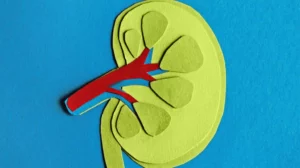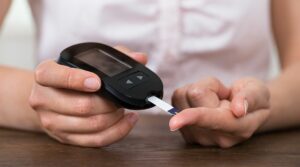Diabetic kidney disease (DKD), also known as diabetic nephropathy, is a common and serious complication of diabetes. The progression of DKD can lead to chronic kidney disease (CKD) and, in severe cases, end-stage renal disease (ESRD), necessitating dialysis or kidney transplantation. However, with early detection and effective management, the progression of diabetic kidney disease can be slowed. This blog aims to shed light on diabetic kidney disease treatment strategies and lifestyle adjustments, providing hope and guidance to those affected by this challenging condition.
Contents
How Does Diabetes Cause Kidney Disease?
 Diabetes can lead to kidney disease through several interconnected mechanisms. Understanding these processes is crucial in preventing and managing kidney damage in diabetic individuals. Here’s how diabetes causes kidney disease:
Diabetes can lead to kidney disease through several interconnected mechanisms. Understanding these processes is crucial in preventing and managing kidney damage in diabetic individuals. Here’s how diabetes causes kidney disease:
- High Blood Sugar Levels
The most fundamental issue in diabetes is elevated blood sugar levels. Over time, these high levels of glucose in the blood can cause damage to various body systems, including the kidneys.
- Damage to Blood Vessels
The kidneys contain millions of tiny blood vessels that filter waste from your blood. High blood sugar can damage these vessels, reducing the kidneys’ ability to perform their filtering function effectively. When the blood vessels in the kidneys are injured, your kidneys cannot clean your blood properly.
- Increased Pressure in the Kidney Filters
Diabetes can also cause increased pressure within the filtering system of the kidneys. This high pressure in the glomeruli (the kidney’s filtering units) strains the system. Ultimately, leading to more damage over time.
- Glomerular Hyperfiltration
In the early stages of diabetic kidney disease, the kidneys may filter too much blood, known as glomerular hyperfiltration. This overwork can stress the kidneys and accelerate the decline in kidney function.
- Inflammatory and Fibrotic Responses
High glucose levels can trigger inflammatory and fibrotic responses in the kidney tissues. These responses can lead to scarring (fibrosis) and loss of functional kidney tissue.
- Nerve Damage
Diabetes can also cause nerve damage in the body. This may affect the bladder, leading to incomplete emptying of urine. It increases the risk of urinary tract infections and further kidney damage.
Managing blood sugar levels and cholesterol levels are key strategies in preventing or slowing the progression of kidney disease in people with diabetes. Regular screening for kidney function, including tests for albumin in the urine and serum creatinine levels, is important for early detection.
What Are The Diabetic Kidney Disease Treatment Options?
 Treating diabetic kidney disease (DKD) involves a combination of medical approaches, including medications and other interventions, aimed at slowing the progression of the disease, managing symptoms, and addressing the underlying diabetes and associated conditions. Here are some of the key diabetic kidney disease treatment options:
Treating diabetic kidney disease (DKD) involves a combination of medical approaches, including medications and other interventions, aimed at slowing the progression of the disease, managing symptoms, and addressing the underlying diabetes and associated conditions. Here are some of the key diabetic kidney disease treatment options:
Blood Sugar Control
Tight glycemic control can significantly slow the progression of kidney damage. This is often achieved through a combination of lifestyle modifications (like diet and exercise) and medications. The choice of medication depends on various factors, including the stage of kidney disease, with options including insulin, metformin (usually used in the early stages of kidney disease), sulfonylureas, DPP-4 inhibitors, GLP-1 receptor agonists, and SGLT2 inhibitors. SGLT2 inhibitors, in particular, have been shown not only to control blood sugar but also to have a protective effect on the kidneys.
Blood Pressure Management
High blood pressure can accelerate kidney damage in diabetes. Therefore, controlling blood pressure is critical. ACE inhibitors and ARBs are preferred because they protect the kidneys beyond their blood pressure-lowering effects. They reduce proteinuria (a marker of kidney damage) and slow down the decline in kidney function. The target blood pressure for patients with DKD is typically lower than that for the general population, often <130/80 mmHg.
Cholesterol Management
Patients with DKD often have elevated cholesterol levels, contributing to cardiovascular risk. Statins are commonly prescribed to lower cholesterol levels and reduce the risk of heart disease and stroke. The specific choice of statin and the target cholesterol level may vary based on the individual’s overall risk profile.
Diuretics
Diuretics are used to remove excess fluid from the body, which helps to lower blood pressure and reduce swelling. They are particularly important in patients with heart failure and advanced kidney disease. However, careful monitoring is required to avoid dehydration and electrolyte imbalances.
Dietary Changes
A kidney-friendly diet is essential for managing DKD. This diet typically involves reducing sodium intake to help control blood pressure, limiting protein consumption to reduce the kidneys’ workload, and monitoring potassium and phosphorus intake, especially in advanced stages of kidney disease. Consulting with a dietitian can be beneficial in creating an appropriate meal plan.
Weight Management and Exercise
Obesity and physical inactivity are risk factors for worsening diabetic kidney disease. Weight loss and regular physical activity can improve glycemic control, reduce blood pressure, and decrease the progression of kidney disease. A combination of aerobic and resistance exercises is often recommended, tailored to the individual’s capabilities and overall health status.
Avoidance of Nephrotoxic Substances
Certain medications and substances can worsen kidney function and should be avoided in patients with DKD. These include over-the-counter pain relievers like NSAIDs, certain antibiotics like aminoglycosides, and contrast agents used in some imaging tests. Patients should always consult their healthcare provider before starting any new medication or supplement.
Newer Therapeutic Agents
Recent advancements have introduced new classes of medications that offer promising results in the treatment of DKD. SGLT2 inhibitors, such as empagliflozin and canagliflozin, not only improve blood sugar control but also have been shown to reduce the progression of kidney disease and the risk of heart failure. They work by blocking the reabsorption of glucose in the kidneys, leading to its excretion in the urine.
Each of these treatment aspects plays a vital role in managing DKD, and often, a combination of these approaches is required to effectively control the disease and improve the patient’s quality of life. Regular monitoring and adjustments by healthcare providers are essential to ensure optimal treatment outcomes.
Lifestyle Approaches For Diabetic Kidney Disease Treatment
 Lifestyle approaches play a crucial role in the treatment and management of diabetic kidney disease (DKD). These strategies complement medical treatments and can significantly impact the progression of kidney disease and overall health. Here are key lifestyle approaches:
Lifestyle approaches play a crucial role in the treatment and management of diabetic kidney disease (DKD). These strategies complement medical treatments and can significantly impact the progression of kidney disease and overall health. Here are key lifestyle approaches:
Physical Activity
- Regular physical activity helps control blood sugar levels, aids in weight management, lowers blood pressure, and improves overall cardiovascular health. Activities can include walking, cycling, swimming, or any other form of exercise that is enjoyable and sustainable for the individual.
- It’s important to consult with a healthcare provider before starting any new exercise regimen, especially for individuals with advanced kidney disease or other comorbid conditions.
Blood Glucose Monitoring
- Keeping blood sugar levels within target ranges is crucial in slowing the progression of diabetic kidney disease. Regular monitoring allows for timely adjustments in treatment.
- Self-monitoring of blood glucose and understanding the impact of foods, activities, and medications on blood sugar levels are vital.
Weight Management
- Maintaining a healthy weight reduces the risk of progressing diabetic complications, including kidney disease. Weight loss can improve insulin sensitivity, lower blood pressure, and decrease the strain on the kidneys.
- For overweight or obese individuals, even a modest weight loss (5-10% of body weight) can have significant health benefits.
Smoking Cessation
- Smoking is a risk factor for the progression of kidney disease and cardiovascular disease. Quitting smoking can slow the progression of kidney damage and improve overall health.
Stress Management
- Chronic stress can negatively impact blood sugar control and overall health. Techniques such as mindfulness, meditation, yoga, or other relaxation techniques can be beneficial.
Regular Health Check-ups
- Regular visits to healthcare providers to monitor kidney function, blood pressure, blood sugar levels, and other relevant health parameters are important. These check-ups can help in early identification and management of any complications.
Avoidance of Nephrotoxic Substances
- Avoiding or using caution with certain over-the-counter medications like nonsteroidal anti-inflammatory drugs (NSAIDs), and consulting with healthcare providers before starting new medications or supplements, is important to prevent further kidney damage.
Hydration
- Adequate hydration is important. But it’s also crucial not to overconsume fluids, especially if there are fluid restrictions due to advanced kidney disease.
These lifestyle interventions require a personalized approach, often coordinated with healthcare professionals, to ensure they are safe, effective, and tailored to the individual’s needs and stage of kidney disease.
Conclusion
In conclusion, diabetic kidney disease treatment requires a multifaceted approach that combines medical treatments and lifestyle modifications. Effective management hinges on tight blood sugar control, diligent blood pressure and cholesterol management, and the use of specific medications that protect kidney function. Equally important are lifestyle changes such as dietary adjustments, regular physical activity, weight management, smoking cessation, and stress management.
Individuals with diabetic kidney disease must work closely with their healthcare team for regular monitoring and personalized treatment plans. Do you want to get rid of diabetes? Join our online diabetes treatment program and reverse Diabetes naturally through lifestyle changes such as a Personalized Diet plan, Exercise, Yoga, dieticians, and health coaches.

